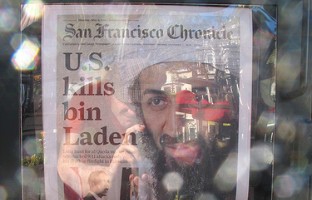Justice or vengeance? The killing of bin Laden: The killing of bin Laden
"For
God and country. Geronimo, Geronimo, Geronimo!" These were reportedly
the words the commander of the Navy SEAL team uttered in signaling that Osama
bin Laden had been killed and his body captured. In a televised speech
announcing this news, President Obama asserted that "justice has been done,"
and he concluded with lines from the Pledge of Allegiance, along with a parting
"May God bless America."
Earlier
on the same day, the second Sunday of Easter, also known as Divine Mercy
Sunday, Roman Catholics and others around the world celebrated the beatification of Pope
John Paul II.
Read our latest issue or browse back issues.
I
write neither to cheer nor to jeer about either the killing of bin Laden or the
jubilant response by many Americans to his death. I pray that my identity as a
baptized Christian takes precedence when the ways of the nation—including
actions by the government and the military but also attitudes and activities
among many of my fellow citizens (and, alas, many fellow Christians)—are in
tension with the ways of God as revealed to us in Jesus Christ. Is the God
being invoked by the commander and the president the same God invoked during
the beatification ceremony? What kind of justice was done in the killing of bin
Laden?
Unquestionably,
bin Laden was responsible for terrorist acts of mass murder of Americans and
others, including fellow Muslims, around the world. Vatican spokesperson Fr. Federico
Lombardi, SJ, observed:
"Osama bin Laden, as we all know, bore the most serious responsibility for
spreading divisions and hatred among populations, causing the deaths of
innumerable people, and manipulating religions to this end." Nevertheless, as
John Paul II wrote
in his 1995 encyclical Evangelium Vitae
("The Gospel of Life"), because God "is always merciful even when he punishes"
evildoers, "not even a murderer loses his personal dignity, and God himself
pledges to guarantee this."
I
am well aware of how difficult it is to view a murderer as possessing dignity.
As a former law enforcement officer in both corrections and policing, I have
seen my share of evil. Yet there it is—the view that even murderers still
have some dignity is part of a cornerstone of Catholic teaching about the
sanctity of life rooted in our being made in God's image and likeness.
Accordingly, in
the Vatican statement, Fr. Lombardi added: "In the face of a man's death, a
Christian never rejoices, but reflects on the serious responsibilities of each
person before God and before men, and hopes and works so that every event may
be the occasion for the further growth of peace and not of hatred." I do not
expect all Americans to share this view, but I do hope that Americans who are
Christians allow it to shape their attitudes and actions.
Of
course, for many Christians this teaching does not mean that a murderer should
go unpunished or be allowed to continue to threaten people. Force may be used
to protect the innocent. But it must be justified and employed in
accordance with the criteria of the just war tradition.
Space
does not permit me to conduct an analysis of the war on terror or of every angle of this particular action. (Was it legal? Was it an assassination?
Was it the result of information gained through torture?) I'll focus on one
aspect that relates to the attitude of celebration on our city streets and university
campuses, and for this I'll turn to St. Augustine (354–430), who offered some
important lessons for Christians who claim to embark upon just wars.
Augustine
anchored the justice of war with God's divine will in creation, wherein God
created humankind to live in a just and peaceable community. Just wars are
supposed to restore and maintain a semblance of that tranquil order. The aim of
a just war—its right intent—should be to restore a just and lasting peace.
Augustine wrote,
Peace should be the object of your desire. War
should be waged only as a necessity and waged only that through it God may
deliver men from that necessity and preserve them in peace. For peace is not to
be sought in order to kindle war, but war is to be waged in order to obtain
peace. Therefore even in the course of war you should cherish the spirit of a
peacemaker.
He
argued that wars were justified to defend the innocent, avenge injuries, punish
wrongs, and to take back something wrongfully taken. He ruled out revenge and
vengeance, let alone mere retributive justice. Rather—and this is tied to his
understanding of right intent—his hope was to
have evil persons repent and reform, thereby restoring the peace. "We do not
ask for vengeance on our enemies on this earth. Our sufferings ought not
constrict our spirits so narrowly that we forget the commandments given to us.
. . . We love our enemies and we pray for them. That is why we desire their
reform and not their deaths."
Augustine
did not think that just war contradicted Jesus' injunction to love one's
enemies. Just war is a form of love in going to the aid of an unjustly attacked
innocent party; however, it is also an expression of love, or "kind harshness,"
for one's enemy neighbor. It aims at turning the enemy from his wicked ways and
toward making amends and helping him rejoin the community of peace
and justice. "Therefore, even in waging war," Augustine wrote,
"cherish the spirit of a peacemaker, that, by conquering those whom you attack,
you may lead them back to the advantages of peace."
But,
one may ask, how is this a benefit or how is it loving for those enemies who
are killed on the battlefield? Augustine replied, "Let necessity, therefore,
and not your will, slay the enemy who fights against you." According to the
latest reports, bin
Laden was unarmed when he was shot above the eye and in the chest—which
leads a number of commentators to question whether these lethal shots were
necessary. Split-second decision making by special forces personnel, as with
police, especially in the dark and in a building where hostile fire has already occurred, is indeed very difficult. If bin Laden had raised his arms in
surrender and still had been shot, I would call that shooting as unnecessary.
Augustine
added that a mournful mood should accompany even justified force. In his view, the "real
evils in war are love of violence, revengeful cruelty, fierce and implacable
enmity, wild resistance, and the lust of power," all of which would be at odds
with restoring a just peace. At the end of the day, even though he regarded
just war as congruent with Christian love, Augustine held on to the belief
that "it is a higher glory still to stay war itself with a word, than to slay
men with a sword, and to procure or maintain peace by peace, not by war."
If
the God that Augustine had in mind when he formulated these reflections were to
shape how we think about war, I doubt there would be much room, if any, for
celebrations about what has been said to have been done "for God and country."






